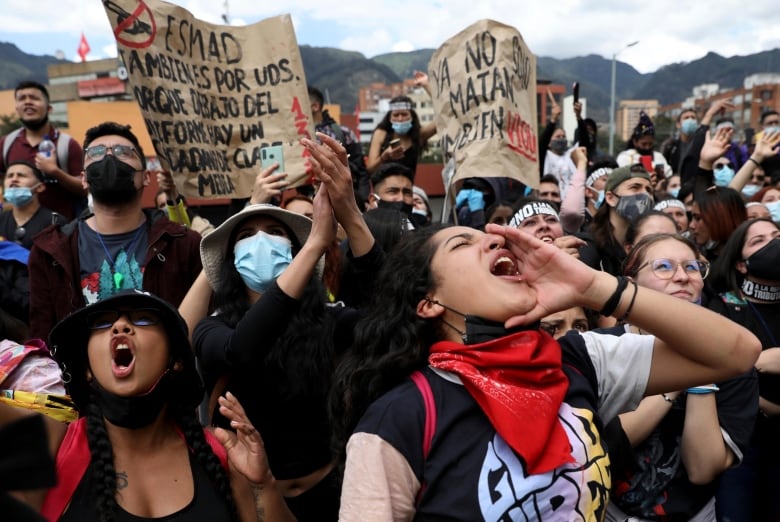Colombia protests stretch into 7th day as UN condemns police violence
Anti-government protests began last week over a proposed tax increase
The United Nations human rights office said it was "deeply alarmed" over violence against protesters in the Colombian city of Cali, where "police opened fire on demonstrators" and allegedly killed and injured several people Monday night.
The statement from the UN High Commissioner for Human Rights comes as anti-government protests sparked by a proposed tax increase enter their seventh day and show few signs of stopping.
According to Colombia's Human Rights Ombudsman, 16 protesters and one policeman have been killed in the demonstrations since last Wednesday. But that figure doesn't include reports of deaths in Cali on Monday, which the UN said it is still trying to confirm.
Here's a look at what's happening.
Anger over tax plan
The protests began after Colombia's government proposed a tax plan aimed at raising $6.7 billion US to pay the country's debts and maintain a basic income scheme for three million low-income people that started during the pandemic.
Protesters marched in a national strike against the government proposal on Wednesday. In Bogota, they held balloons and signs that read "no to tax reform" in Spanish.

(Fernando Vergara/The Associated Press)
In Medellin, some demonstrators performed acrobatics as they protested the tax reform bill.

(Joaquin Sarmiento/AFP/Getty Images)
Some protests saw clashes erupt between police and demonstrators, as well as property damage. A public transportation bus was left in flames during a protest in Cali.

(Paola Mafla/AFP/Getty Images)
President withdraws plan
Wednesday was just the beginning. On May Day, or International Workers' Day, on Saturday, people shouted slogans during a demonstration against the tax reform in Bogota.

(Fernando Vergara/The Associated Press)
Police stood guard against protesters at the entrance of President Ivan Duque's home.

(Fernando Vergara/The Associated Press)
Amid the protests, Duque withdrew the tax plan on Sunday. He has said his government will draw up another proposal — the result of consultations with lawmakers, civil society and businesses.
People on motorcycles celebrated at Bolivar square in Bogota after the proposal was withdrawn.

(Fernando Vergara/The Associated Press)
Duque's finance minister also resigned the following day. But large demonstrations and roadblocks have continued.
Police actions criticized
Numerous videos have emerged on social media showing police using excessive force during the protests and even shooting at some demonstrators point blank.
On Monday, people attended a vigil in Cali in honour of Nicolas Guerrero, who died after being shot on Sunday during a protest against the tax reform.

(Andres Gonzalez/The Associated Press)
In its statement, the UN urged Colombia's government to protect the rights of protesters.
"Law enforcement officers should abide by the principles of legality, precaution and necessity of proportionality," the statement said.
The protests have continued into Tuesday and spread to other countries. In Argentina, demonstrators rallied outside the Colombian consulate in Buenos Aires to condemn police actions during the protests. They held signs with messages such as: "In Colombia they are killing us."

(Agustin Marcarian/Reuters)
Back in Colombia, the security presence remains strong. Soldiers and army tanks were seen guarding toll booths to keep protesters from damaging them on the outskirts of Bogota on Tuesday.
(Fernando Vergara/The Associated Press)
In a video Tuesday, Duque said the government is ready for national dialogue. Mass marches and a national strike are planned for Wednesday.
With files from Reuters
